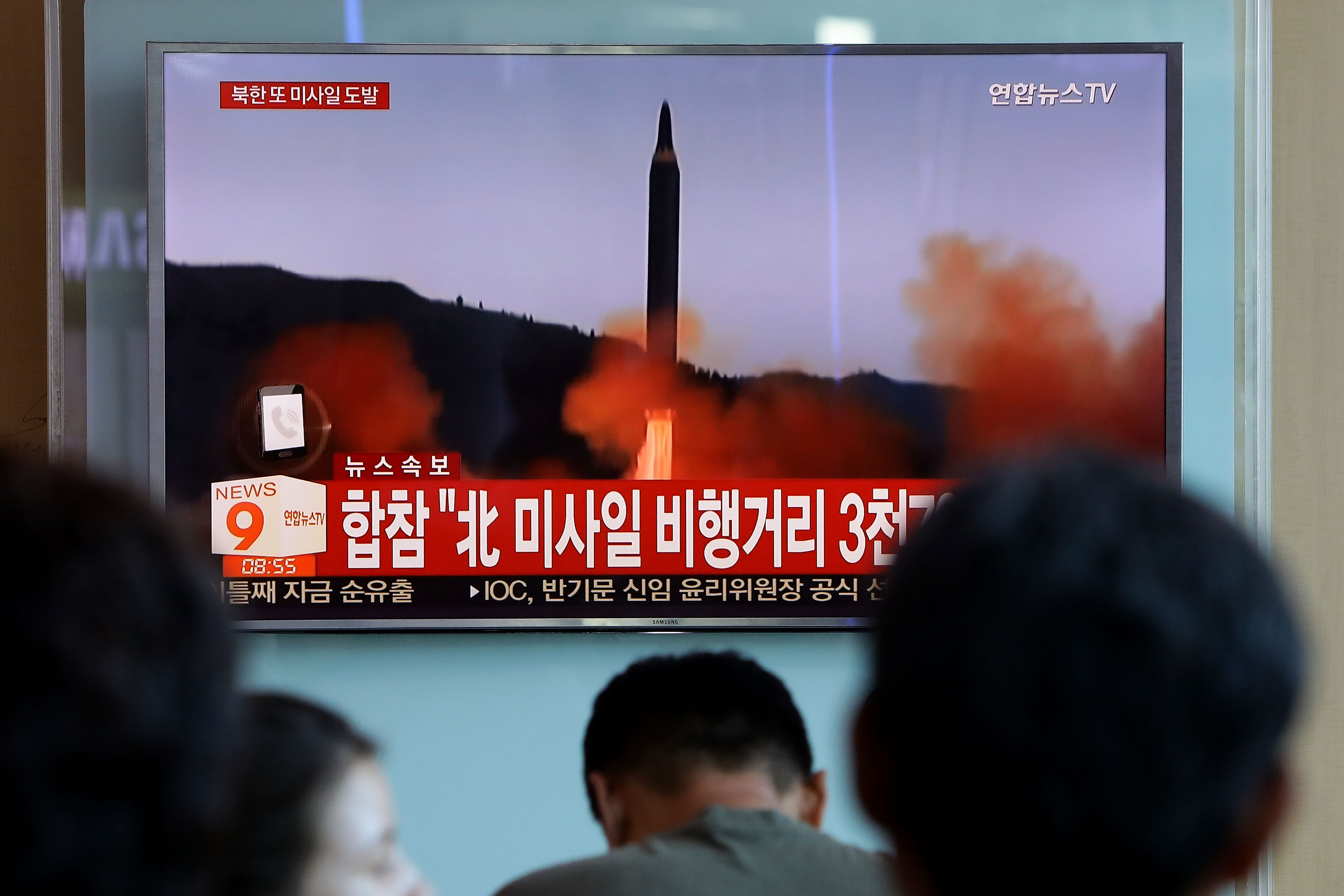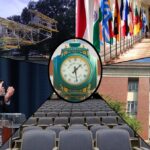
While there are no easy choices for what to do about North Korea, a preventive attack is a very bad idea.
Is a revival of the Korean War necessary? Senior U.S. leaders are considering military options for dealing with North Korea’s pursuit of an intercontinental nuclear capability. In response to North Korea’s most recent provocative missile test flying over Japan last week, President Trump indicated that preventive military action was under strong consideration as he emphasized that U.S. military options to respond were both “effective and overwhelming.” National security advisor Lieutenant General H.R. McMaster confirmed at a White House press conference that “for those who have…been commenting about a lack of a military option, there is a military option” for dealing with the emerging threat from North Korea.
While there are no easy choices for what to do about North Korea, a preventive attack is a very bad idea. First, it is not yet necessary. The option space for decisions has not diminished to the point that such an attack is justified. Second, it poses enormous risks, such that the costs would far outweigh the benefits. Indeed, it would likely provoke the very North Korean nuclear attack that U.S. policy seeks to avoid. A far more prudent course of action would have U.S. policymakers take immediate steps to strengthen conventional and nuclear deterrence postures in order to blunt this emerging threat.
Imminent Threat? Not Yet
The argument for a preventive attack (as argued recently by John Mauk here in the War Room) erroneously assumes that there is only a narrow window for effective immediate U.S. military action. This would be the presumed brief period of time between now and when North Korea develops the necessary technologies to successfully mount a nuclear warhead on an intercontinental ballistic missile capable of hitting a major American city. But U.S. intelligence estimates give us little confidence that we have entered into this limited window of vulnerability suggesting that it will be 1-4 years before North Korea will be able to mount a nuclear missile attack against the U.S. homeland. Although the threat from North Korea is clearly growing, some senior security practitioners have voiced their doubts that the situation represents an immediate and existential threat. For instance, General Paul Selva, Vice Chairman of the Joint Chiefs of Staff, testified this summer that despite the obvious advances in nuclear and ICBM technologies, the threat from North Korea was not imminent as it lacks “the capacity to strike the United States with any degree of accuracy or reasonable confidence of success.” Other independent analysts including a former Los Alamos National Laboratory director who has visited North Korea on several occasions have concluded that “it will take Pyongyang several more years to seriously threaten the U.S. with nuclear-tipped missiles.” Moreover, scientific analysis published in the Bulletin of the Atomic Scientists in August concluded that North Korea’s most advanced missile “does not currently constitute a nuclear threat” to the continental U.S. A preventive attack against North Korea would be premature, and would be taken before exhausting all other non-military opportunities to potentially roll back or restrain North Korea’s nuclear or missile programs.
On the other hand, more pessimistic analysis suggests that North Korea’s capabilities have advanced to the point where a preventive attack would be too late to be effective. Some experts believe that recent missile tests prove that North Korean missiles are “capable of striking Los Angeles, Chicago, and potentially even New York.” Former deputy director of the CIA, Mike Morell directly challenged the conventional wisdom voiced by General Selva, writing “I believe that North Korea has the technical capability and has had the time necessary to make a nuclear weapon small enough to fit on a long-range missile and to ensure that the warhead can survive the vibrations, pressures, and heat of reentry.” If this analysis is correct, a U.S. preventive military attack is almost certain to invite rather than prevent a North Korean missile attack placing millions of American citizens at immediate risk.
What Strengthened Deterrence Would Look Like
Given these critical uncertainties surrounding the urgency of the North Korean threat, U.S. policymakers would be far better off to take immediate measures to strengthen deterrence along the lines advocated by my colleague Steven Metz from the Strategic Studies Institute. Steps would include public statements by President Trump and his national security team to establish clear “red lines” that if crossed would lead to overwhelming U.S. military action including the prospect of regime change in Pyongyang. These same officials can reassure allies that they remain protected behind a U.S. extended nuclear umbrella. These pledges of action and declarations could be practically reinforced in the near-term by actions on the ground including an expanded program of coalition and unilateral military exercises, deploying additional military forces to the region on either a rotating or permanent basis as determined in consultation with allies, bolstering missile defense capabilities to protect both U.S. deployed forces and allies, and increased visibility to concrete U.S. interagency planning for the eventual collapse of the Kim Jong Un regime.
These actions would immediately bolster nuclear deterrence in the most dangerous case that North Korea has already developed the capability to attack the U.S. homeland. Moreover, if North Korea’s nuclear development has not yet reached this critical stage, these steps provide additional space and time for diplomacy, sanctions, and other instruments of national power to convince leaders in Pyongyang that a freeze or roll-back in their nuclear and missile programs might be the most prudent course to forestall a military confrontation with the U.S. that threatens the survival of the regime itself.
Deterrence Preserves the Possibility of Peace
Evidence suggests that deterrence holds great potential for deterring a North Korean nuclear attack. The combination of U.S. conventional and nuclear dominance has successfully deterred a major North Korean attack for decades. The case for preventive war often relies on the faulty assumption that urgent military action is required precisely because Kim Jong Un is an irrational actor who cannot be deterred by threats of overwhelming retaliation. To the contrary, several analysts suggested that Kim’s actions are “very rational” if one considers his primary objective as regime survival. Joshua Pollack, a leading non-proliferation expert focusing on Northeast Asia, recently made a compelling case for the logic of Kim’s pursuit of a nuclear weapon in a recent article in The Atlantic.
Dictators responsible for the deaths of millions (including Mao and Stalin) have been successfully deterred from using their nuclear weapons by U.S. policies that stopped short of preventive war.
The Kim dynasty has long successfully threatened military action and exchanged limited and temporary restrictions on its nuclear programs for fuel, food, and sanctions relief. Moreover, the single greatest outside threat to the Kim regime has long been the United States. As recent history suggests, countries without a nuclear capability are vulnerable to American-sponsored regime change (Afghanistan, Iraq & Libya) while those possessing even advanced civilian nuclear programs are relatively immune (Iran – at least thus far). Consequently, pursuing a nuclear deterrent makes eminent sense from the narrow and self-serving vantage point of Kim Jong Un. His single overriding goal is regime survival.
Moreover, nuclear deterrence has a perfect record of success since the United States dropped atomic weapons on Japan to end World War II in 1945. Dictators responsible for the deaths of millions (including Mao and Stalin) have been successfully deterred from using their nuclear weapons by U.S. policies that stopped short of preventive war. As Jeffrey Lewis, Director of the East Asia Nonproliferation Program, asks: “Why do we hold the North Koreans to a different standard than we held Stalin’s Soviet Union or Mao Zedong’s China?” The proponents of preventive war simply don’t have a convincing response to Lewis’s question.
Prevention Guarantees Costly and Uncertain War
The costs of U.S. preventive military strikes are manifest. Even advocates like Mauk admit that that “tens of millions” of South Korean or Japanese civilians will die in the likely event chemical, biological, or nuclear weapons are used. This would be in addition to the tens of thousands of American troops and civilians who would become the immediate casualties of North Korea’s “5.000-6,000 artillery and rocket launchers within range of the Seoul metropolitan area.”
Even more daunting than these devastating projections, preventive action could provoke “China’s entry into the conflict on North Korea’s behalf” as Mauk suggests. Such a development would place two nuclear-armed superpowers in direct armed conflict raising the very real specter of World War III and a global thermonuclear war. Harvard historian Graham Allison has recently highlighted the risk that a U.S.- China confrontation over North Korea could push both countries toward a “Thucydides trap” leading to the 21st century’s first major power war. These are substantial risks inherent to the option of preventive war that cannot be dismissed or trivialized.
For many analysts and foreign policy practitioners these anticipated costs of preventive action render this option virtually unthinkable despite recent suggestions to the contrary by the Trump administration. Former NATO Supreme Allied Commander, retired General Wesley Clark recently observed that “there are no good military options with Korea…we’re at the end of the line.” Steven Bannon, until recently a top strategist for President Trump, put it more bluntly saying “until somebody solves the part of the equation that shows me that 10 million people in Seoul don’t die…there’s no military solution here.”
The Benefits of Preventive War are Uncertain
The case for preventive war also presumes a U.S. capability to destroy North Korea’s nuclear and missile infrastructure. This is yet another dubious assessment. North Korea is one of the most opaque and isolated regimes in the world. No one can confidently claim to have a deep appreciation for the decision-making process in Pyongyang, nor thorough knowledge of the location of all of its nuclear warheads and missiles. As former Air Force Chief of Staff Merrill McPeak recently suggested locating and destroying North Korea’s nuclear arsenal would require a “house-to-house search.” Neither have analysts nor U.S. policymakers confidently outlined a scenario wherein preventive strikes facilitate a stable transition to new leaders in Pyongyang who would willingly abandon North Korean nuclear ambitions. Instead a preventive attack will quite likely prompt a dangerous and unpredictable leadership crisis in Pyongyang, provoke a massive refugee crisis, leave some elements of North Korea’s nuclear and missile infrastructure intact and available for retaliation, and give greater impetus to the North’s pursuit of an advanced nuclear capability to deter further external efforts to forcefully promote regime change.
The Unpredictable Outcome of Preventive War
Advocates of preventive war must also grapple with the prospects of the unintended consequences of U.S. preventive military strikes. The fact that the U.S. still mired in conflicts in Afghanistan and Iraq long after American military operations effectively deposed the leadership in Kabul and Baghdad are cautionary tales that should not be ignored. Furthermore, advocates often too easily dismiss the prospect of Chinese intervention. For instance, Mauk writes unconvincingly that “China may be convinced to remain neutral if given certain necessary assurances.” However, the nature of those assurances remain unspecified, making an honest assessment of his proposal impossible. Experts on China appear united in their belief that China’s greatest fear is not a nuclear-armed North Korea, but instead the chaos and disaster that would accompany a regime collapse in Pyongyang and the prospect of the emergence of a united Korea under the domination of the United States. A U.S. preventive attack would heighten fears of precisely these outcomes, and could very well provoke an unpredictable, emotional, and forceful retaliation from Beijing with devastating consequences for North Korea, Asia, and the world.
Conclusion
Georgetown University’s Victor Cha, President Trump’s expected nominee for Ambassador to South Korea and top Asian advisor to President George W. Bush, once described U.S. policy on North Korea as “the land of lousy options. … You’re choosing between bad, worse and the worst.” President Trump has temporarily ruled out the prospect of diplomacy, leaving preventive attack and deterrence as the two major remaining policy options. The risks of preventive war, however, are understated and its potential benefits are oversold. As Stanford Professor and nuclear weapons expert Scott Sagan recently argued in Foreign Affairs, deterrence remains far and away “the best option” among a range of poorer policy approaches.
Christopher Bolan is a Professor at the Strategic Studies Institute of U.S. Army War College. The views expressed in this article are the author’s and do not necessarily reflect those of the U.S. Army, the Department of Defense, or the United States Government.
PHOTO: People watch a television broadcast reporting the North Korean missile launch at the Seoul Railway Station on September 15, 2017 in Seoul, South Korea. PHOTO CREDIT: Chung Sung-Jun/GETTY





SIR, thanks for your analysis.
A very rational and well formed argument. A preventive attack on North Korea is certainly not a preferred response but posing it elicited a necessary debate. That said, effective deterrence comes with certain risks. Deterrence accepts a compelling threat ans assumes a rational actor in Kim Jong Un. European nations likewise assumed a rational actor in Adolph Hitler reconciling an appeasing response to German rearmament until it was too late. History speaks loudly on the consequences of intellectual rationalization and equivocation in the face of a clear threat. We have seen much the same situation before where ambition and meglomania exceeded rational thought.
How did France and Britain react to Hitler’s violation of the Treaty of Versailles? They protested but did little beyond appeasing Hitler. The French adopted a defensive policy against a potential German threat and built the Maginot Line. The British banked on negotiation going so far as to sign the June 1935 the Anglo-German Naval Agreement and then the Munich Agreement believing that this approach would satisfy Hitler and that he would no longer have reason to feel boxed in by old enemies and the terms of Versailles.
North Korea has spent decades building the largest standing Army in the world at 1.3 million according to GlobalSecurity.org, while the world has watched and wrung its hands. They have also developed one of the largest chemical and biological arsenals in the world. They now have an intercontinental ballistic capability that will soon be nuclear if not already so. Can we afford to believe that Kim Jong Un can be deterred from his stated intent to unify the peninsula by force? How much does one trust that a despot who starves and brutalizes his own people will not attack actors he believes want to remove him from power?
Academics like Boling have the luxury of offering very rational arguments on how to deal with crises without responsibility for the consequences of failing to act. Academics may look at this situation rationally but how much credibility can we afford to place in Kim Jong Un’s rational approach to international deterrence?
Deterrence should and will continue to be a part of the equation, that’s not in question. What’s under consideration is whether or not the DPRK’s nuclear weapons will lead to conflict in the future. If it does, would it be better or worse to wait for the conflict to come before doing anything about the DPRK’s nuclear weapons? In the context of the latter consideration, deterrence clearly isn’t the “best” bad option. I don’t know where or when it’s ever the “best” option to let the enemy obtain more nuclear weapons in that situation. So, the discussion at this time needs to focus on the first consideration – will a nuclear armed KJU eventually lead to war?
The Joshua Pollack article seems short on evidence. There is nothing supporting the idea that KJU is a “logical” actor, certainly not in the article referenced. Even the idea of KJU being enticed with assurances of regime survival is speculative at best. Besides his guesses, it would be nice to know why Pollack thinks KJU’s main aim is to “pull off the same trick” that the PRC did. Strangely, this idea assumes that there’s no hostility between the PRC and the US. As if the US has completely stopped condemning PRC human rights abuses, ceased freedom of navigation activities in the South China Sea, or halted multi-national exercises in the Pacific region. While it is polite hostility, it’s hostility none the less. For KJU to achieve a similar condition with the US as that currently between the PRC and the US (what Pollack suggests), it may require similar starting conditions. To answer Jeffrey Lewis’ question – Stalin and Mao had at least some semblance of government behind them, whereas KJU has none. As best as we know, it’s all him and the Kim cult. It’s not as if there’s indications of a presidium taking over if KJU dies as what happened with Stalin. Would there be a non-family member successor like Hua Guofeng did after Mao died? The conditions just aren’t similar. At least not that we know of. So, if it’s not the same condition, and we have no realistic picture of KJU as stable political actor, can we really say that KJU’s main aim is to establish some politico-military equilibrium with the West that will lead to peace? Or are we on our way to a nuclear tragedy in North East Asia and the US?
We can continue to assume that KJU is solely interested in preserving his regime, even without all the other distractors of lifting “hostility and imperialism.” Maybe he’ll give up nuclear weapons after much assurance. Unfortunately, the West is working at a disadvantage because Qaddafi’s experience probably didn’t give KJU any reassurance. If I understand correctly, Qaddafi made significant concessions regarding weapons and terrorism, yet he still ended up… well…dead. One has to wonder what kind of effect that had on the level of paranoia in Pyongyang. Even the PRC is getting tired of North Korea. It would not be surprising if that also add to KJU’s paranoia. How do you convince someone of the desire for peace if they don’t trust you? Sadly, and ominously, all that points to an unstable KJU who may already be gearing up for war. Then there’s an extreme speculation of a fatalistic KJU who thinks of his regime as the last of the Kims. Clearly there’s uncertainty in all that, but what to do with that uncertainty? Select the “best” bad option? Well, that’s why leaders get paid. In the meantime academics can afford the luxury of recommendations/positions they won’t be held accountable for.